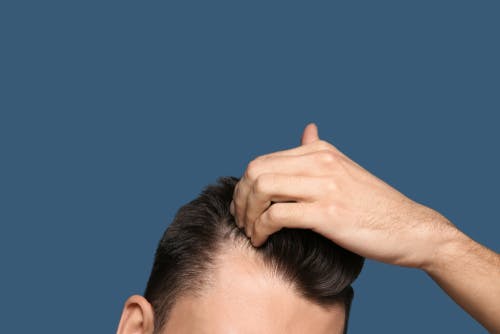How long do hair growth pills take to work?
A common misconception about hair pills is that they instantly cure hair loss or similar conditions. To treat the hair loss, you’ll need to determine what’s causing it first.
Most of the time, hair loss and other similar problems are signs of a disorder, illness, or genetic predisposition, not illnesses in and of themselves. [1]
Hair loss can be caused by genetic, endocrine, immune, or inflammatory problems. It could also be a sign of a nutrient deficiency that may represent a modifiable risk factor associated with the development, prevention, and treatment of alopecia. Hair loss may also be linked to common symptoms of depression and may be a sign of deteriorating mental health.[3]
Alopecia is the medical term for hair loss and includes hair thinning and pattern baldness in both males and females. Depending on the type of alopecia you have, you may opt for topical treatments or invasive hair loss treatments to better address your condition.[4]
Without getting too technical, some treatments, like hair strengthening pills or hair vitamins, are dedicated to hair issues; it’s encouraged to take specially formulated medication for which they were designed. This is so you may achieve the ideal results, as these treatments are optimised to target specific factors that are causing hair loss.
Always consult with a doctor or a medical professional before taking any prescription hair pills or performing any topical or surgical treatments. Your doctor will be better equipped to determine how long a particular treatment should last and what results you may reasonably expect.
How many times a day should I take hair loss pills?
The treatment period and intake or application frequency of your hair loss treatment will depend on many factors.
One such factor is nutrient deficiency or a chemical imbalance within the body. A common claim among hair growth pills is that nutrient deficiency causes hair fall or hair thinning, however there is little clinical data to support their ability to treat hair conditions.[5] Hormonal changes can contribute to hair loss,[7] as can excessive psychological stress or physical trauma.[8]
Another is simple genetics. Some of us are just naturally inclined to lose hair as we age; as of this writing, there are no known cures for these conditions, but treatment is available to slow or stop hair loss.[9]
We cannot also discount mental or psychological disorders. Pica (eating or craving of things that are not food) and trichotillomania (hair pulling is a way of dealing with negative or uncomfortable feelings) are known disorders that lead to induced hair loss and may require dedicated mental health services rather than hair pills for treatment.

